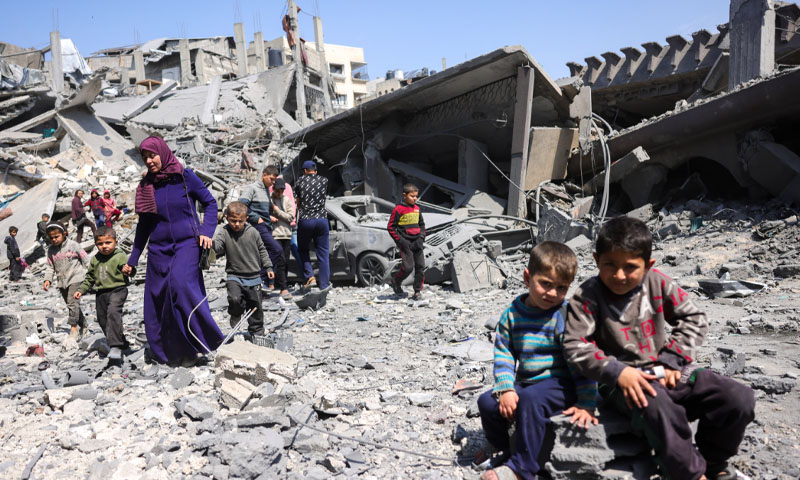- Web Desk
- Yesterday
Business leaders hail IMF deal, critics caution on risks
The $7 billion, 37-month IMF package has mitigated the risk of a sovereign default by unlocking access to relatively cheaper credit, enabling the timely repayment of $26bn in debt due this fiscal year. However, now the key concern remains the stringent conditions attached to the deal and determining who will ultimately bear the burden of the proposed policy changes.
Most experts concur that the IMF deal, however painful, was necessary to prevent an economic collapse. However, some voices, particularly from vulnerable segments, challenge the inevitability of turning to multilateral donors for a bailout. Some critics outright reject the agreement, labeling it anti-people and reinforcing elite-centric structure. Others argue that the government should have negotiated more rigorously to ease burden on an already stressed populace.
Media discussions have largely centered on the recommended policy changes, emphasizing the need for full transparency in the country’s financial affairs and strict fiscal discipline by plugging loopholes in the tax system created by subsidies and exemptions. There is renewed push to bring retail, agriculture, real estate and export sectors into the tax net, applying the same rates as other sectors without exceptions.
There has been some debate around privatizing loss-making state-owned enterprises (SOEs), reducing the oversized government and renegotiating resource sharing between the federal government and provinces in line with IMF demands. However, there seems to be confusion and differing opinions within the government on sequencing and the timings on these matters.
Kristalina Georgieva, Managing Director, IMF, dismissed the notion that the IMF is responsible for the economic hardships faced by the people, emphasizing that the institution has consistently urged successive governments in Pakistan to collect taxes more judiciously from the wealthy and to strengthen social programmes to support the poor. Speaking to the media on the sidelines of the UN General Assembly, Georgieva discussed the Pakistan deal, expressing her belief that Prime Minister Shehbaz Sharif’s government has demonstrated seriousness and a strong commitment to taking necessary measures to restore economic stability while safeguarding the vulnerable.
The managing director was quoted as saying, “I congratulate the government and the people of Pakistan for advancing with the home-defined, Pakistan-owned reforms that are starting to bear fruits. Growth is rising, inflation is falling, and the economy is now on a more stable path.”
Following the news of the IMF deal, Pakistan’s business leaders expressed elation, viewing it as an endorsement of the government policies. They anticipated that it would enhance the country’s standing in global credit markets and reassure investors who had been unsettled by aggravating global conflicts, market volatility and potential supply chain disruptions.
Corporate leaders, including Ehsan Malik, CEO, Pakistan Business Council, Shahid Sattar, Secretary General, All Pakistan Textile Mills Association, M Abdul Aleem, Secretary General, Overseas Investors Chamber of Commerce and Industry, Khurram Mukhtar, Patron-in-Chief, Pakistan Textile Exporters Association, among others, recognised 24th Extended Fund Facility as a positive step in easing pressure on foreign exchange reserves, improving liquidity and stabilizing the currency market. They noted that these factors collectively enhance the business environment but cautioned that over-taxation could hinder industrial activity and stifle exports.
Critical voices from the business community, particularly the Karachi Chamber of Commerce and Industry and the Khyber Pakhtunkhwa Traders Union, have expressed concerns. Younus Dagha, former federal secretary and Chairman of the Policy Research and Advisory Council at KCCI, emphasised that while IMF programmes provide temporary financial relief, they lack a sustainable long-term economic strategy. He highlighted that without addressing Pakistan’s structural weaknesses, such programmes often lead to damaging revenue measures, as seen in countries like Argentina and Egypt. Dagha warned that Pakistan faces similarly high energy costs, an unsustainable tax regime, and fiscal indiscipline. “Although the IMF program may offer short-term stability, it lacks strategy pm critical reforms needed to improve the investment climate.
Malik Mehr Illahi, President of the Khyber Pakhtunkhwa Traders Union, voiced doubts about the effective utilization of the funds. He criticized the government’s aggressiveness as compliance with the IMF’s revenue demands. Illahi specifically highlighted the abrupt suspension of a traders’ survey, after which the government unilaterally imposed tax rates based on the value of assets rather than actual income, a decision he deemed unfair and unjust.
Economists and trade unionists were also approached for their insights, but their responses were pending at the time of this report publication.
An analyst who has studied Pakistan’s relationship with the IMF relationship over the past 50 years, preferring to remain anonymous, raised several critical points: “At the start of each IMF programme, the public is urged to endure short-term hardships — higher taxes, increased utility bills and job losses resulting from contractionary policies. Promises are made of long-term gains as stabilization efforts supposedly restore the economy and leads to higher growth rates. We hear that prosperity will lift all boats. The reality, however, is that those who bore the greatest burden of stabilization are consistently excluded from the benefits of growth. It cannot be mere coincidence that wealth disparity in Pakistan has widened during these short=lived high-growth phases.”






